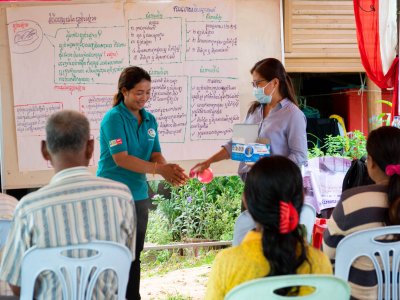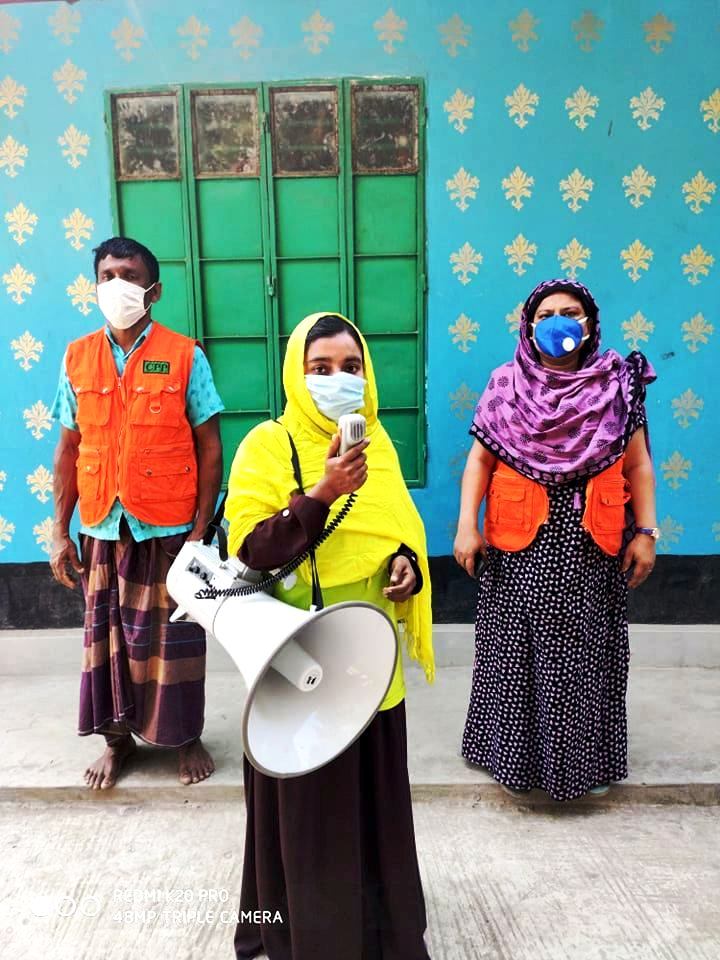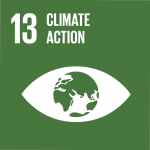The impacts of COVID-19 on adaptation planning in Asian LDCs

10 June 2020, Bangkok Thailand: Asia was the first region to deal with the onset of COVID-19. Since then, Asian Least Developed Countries (LDCs) have been facing unprecedented challenges due to the impact of the pandemic, which is placing an increasing burden on capacity.
The GEF funded National Adaptation Plan Global Support Programme (NAP-GSP), in collaboration with SLYCAN Trust, held a webinar to hear experiences from least developed countries (LDCs) in Asia to discuss the impacts of COVID-19 on their adaptation planning. The webinar looked at how Asian LDCs are addressing the challenges, whilst planning to ‘build back better’ through the National Adaptation Plan (NAP) process.
Almost 80 participants attended this webinar, which highlighted experiences from Bangladesh, Cambodia and Maldives and Nepal. The discussion indicated that whilst the pandemic is immensely problematic for all LDCs, countries are proactively rising to the challenge in unique ways.
Lead Technical Specialist of the NAP GSP, Rohini Kohli (UNDP) welcomed participants and introduced the webinar. She said, “This is a health crisis with socio-economic and environmental implications. We are manoeuvring our on-going climate change adaptation work around a global pandemic. Many current conversations with countries in this region centre on planning to ‘build back better'. Part of building back better starts with exchanging experiences, challenges and solutions.”
Leaving no one behind in Bangladesh
 In Bangladesh, the government is currently focussed on providing resources for the public health sector. Resources and capacity for adaptation and mitigation planning are expected to reduce as a consequence. The disastrous ongoing effects of Tropical Cyclone Amphan, which struck in May 2020, compound these challenges.
In Bangladesh, the government is currently focussed on providing resources for the public health sector. Resources and capacity for adaptation and mitigation planning are expected to reduce as a consequence. The disastrous ongoing effects of Tropical Cyclone Amphan, which struck in May 2020, compound these challenges.
Mr. Arif Faisal, Programme Specialist, Environmental Sustainability and Energy, UNDP Bangladesh, said, “Many communities in the south-western coastal areas are struggling with the health crisis and they are also suffering from devastating floods due to Cyclone Amphan. The Government of Bangladesh aims to provide funds to sustain them, further jeopardising other spending plans.”
Mr. Faisal noted that except emergency and health department, some of the government departments are closed due to the COVID-19 with only 25 percent of personnel currently working in office with maintaining social distance and proper health norms. COVID-19 travel restrictions mean local level consultation is disrupted and remote consultation is almost impossible - since the poor community lack access to necessary ICT connectivity.
He said, “Our NAP process is inclusive and aims to ‘leave no-one behind’. Moreover, scheduling a virtual meeting with poor and vulnerable communities is not feasible as they do not have ICT facilities and they are not familiar and well-conversant with using virtual meeting. Our NAP team are implementing an alternative virtual work modality. But time, technology and resource constraints remain.”
The challenges and successes in Cambodia
The ongoing socio-economic and public health crisis is primarily affecting the most disadvantaged communities. Dr. Heng Chan Thoeun, Department of Climate Change, Cambodia, said, “Local communities in Cambodia are already affected by economic decline caused by COVID-19, leading to increasing vulnerability.”
Specific challenges for adaptation planning include the current inability to undertake local level consultation. A vital building block of successful NAPs is the collaborative and consultative process that involves many sectors and stakeholders. Many local government units in LDCs lack the resources to maintain their operations and continue to operate virtually.
In Cambodia, the NAP has been developed and the process is ongoing to revise and update the NDC. Despite COVID-19 the process is ongoing, in alignment with the NAP process and priority issues in the country. The country remains on track to submit their NDC by October 2020. Dr. Heng Chan Thoeun, said, “Cambodia is committed to climate resilient green growth, with sustainable land use playing a key role.”
It is apparent that whilst momentum for adaptation planning remains strong, capacity and financing are stretched. Consultations and negotiations are delayed at the local, national and also global level – particularly with the postponement of the United Nations Climate Change Conference (COP26) from 2020, to November 2021.
Building back greener in Nepal
Dr. Maheshwar Dhakal, Joint Secretary, Government of Nepal and Focal Point (UNFCCC, UNCCD) noted that Nepal has now been engaged in the NAP process for a decade. The past three years has seen the successful development of the Green Climate Fund (GCF)-supported NAP project supported by UNEP. Based this experience, the Government of Nepal has developed a new climate policy, focussed on Nepal’s climate impacts and needs in the context of the Sustainable Development Goals (SDGs).
Dr. Dhakal said, “COVID-19 cannot be ignored. Health issues pose the highest priority as it is affecting, economy, social and environment. But we are in a strong position to continue to strengthen our NAP process.”
COVID-19 is considered an opportunity to focus attention on strengthening ecosystem-based and nature-based solutions, whilst redoubling efforts to support the most vulnerable communities, which are impacted most by climate and public health crises.
In Nepal, this means a focus on ecotourism to revitalise the tourism sector. Like many LDCs, COVID-19 has led to collapse of the tourist industry, requiring the country to look at ways to stimulate rebuilding. Dr. Dhakal said, “Nepal is looking to ‘Build back Better’ by building back greener. We aim to do this through three key areas: Resilience – particularly regarding water resources, clean energy, and nature-based tourism. We need a thriving ecosystem-based approach to tourism to build back greener.”
Nepal remains committed to submit an enhanced NDC by COP26. The postponement means the process is delayed slightly with a likely submission date of end 2020 or early 2021. The country is focussed on completing community consultations, as a vital step towards finalising the NDC – and these will be conducted as soon as COVID-19 restrictions are lifted, enabling access to local communities.
Aligning NAPs and NDCs in the Maldives
While the Maldives graduated from the LDC category in 2003, the country brought the Small Island Developing States (SIDS) perspective to the discussion and their process to obtain GCF support for formation of the NAP. The country has already conducted extensive data analysis and vulnerability assessments – establishing the NAP as a living process involving all stakeholders.
Mr. Ali Shareef, Climate Change Department, Ministry of Environment, Maldives, said, “The goal is that the meaningful adaptation actions to be established within the long-term NAP process, which will form the basis for political cycle-driven short term plans.”
The Maldives has conducted mitigation modelling for the NDC and is now further strengthening their adaptation component. Mr. Shareef said, “COVID-19 has provided a big opportunity for Maldives to align its NAPs and NDC with green economic and resilient concepts during recovery.”
Whilst COVID-19 has in some ways adversely impacted the timeframes of NAP processes in LDCs, and threatened ongoing development work, the pandemic has brought into stark focus the priorities, processes and policies and which will ultimately strengthen the NAPs.
Climate change increases the likelihood of pandemics. With this in mind, the webinar panellists agreed that the NAP process is more relevant now than ever before. They called for intensified urgency to scale up NAPs based on the best science and data, and plan for resilience – including in public health systems – towards ‘building back greener’.
Through highlighting the potential for a 'health-climate nexus', the webinar provided insights into how effective climate responses are relevant to the COVID-19 recovery plans, as well as first-hand experiences to support LDCs navigate the ‘new normal’.
*****************
This webinar was the first in a series of webinars from NAP-GSP to be conducted in 2020 focussing on how COVID-19 has impacted National Adaptation Plans process and ongoing development work in LDCs globally. This webinar was conducted by NAP-GSP in partnership SLYCAN Trust. The webinar was held via Clickmeeting at 15:00-16:00 (UTC+7) and broadcast via Facebook Livestream (More information).
NAP-GSP would like to thank the following for their valuable contributions:
- Moderator: Vositha Wijenayake, SLYCAN Trust
- Introduction: Rohini Kohli, Lead Technical Specialist, National Adaptation Plan - Global Support Programme (NAP-GSP), UNDP
- Panellists:
- Mr. Ali Shareef, Climate Change Department, Ministry of Environment, Maldives
- Mr. Arif M. Faisal, Programme Specialist, Environmental Sustainability & Energy, UNDP Bangladesh
- Dr. Heng Chan Thoeun, Department of Climate Change, Cambodia
- Dr. Maheshwar Dhakal, Joint Secretary, Government of Nepal, Project Director (NAP Project), Focal Person (UNFCCC, UNCCD)
